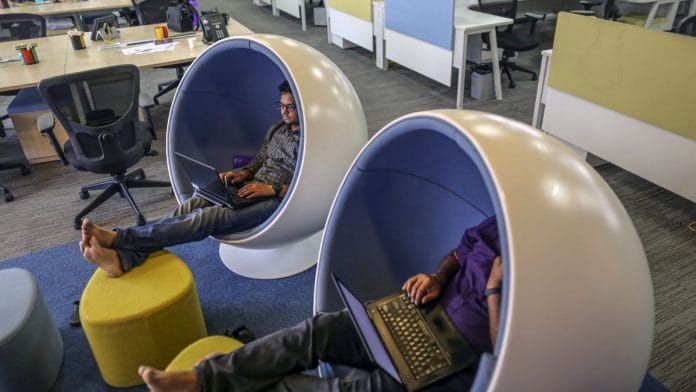Venktesh Shukla, a leading angel investor, says India’s civil services officers are the ‘worst’ to devise startup policies.
New Delhi: A prominent angel investor has blamed civil servants for stymieing India’s startup growth, saying a review of the current approach was necessary for the country to become the next global superpower.
Venktesh Shukla, the former global chair of the world’s largest entrepreneur network, The IndUS Entrepreneurs (‘TiE’), and now a general partner in the US-based startup investment firm Monta Vista Capital, was speaking at an event organised in Delhi Monday by the Centre for Policy Research (CPR).
A former Indian Revenue Service (IRS) officer, Shukla, 64, said civil services officers were the “worst” people to decide policies for startups because they had very little experience in entrepreneurship, investment or running a business.
“They have never created a job in their lives,” he added.
“Take a nonsensical policy they created… [that] startups of less than three years don’t need to pay income tax,” Shukla said, adding, “Startups at that stage anyway don’t make money to pay income tax. Policies like this only allow bad actors with ill intentions to position themselves as startups.”
Another policy he cited was the 30.9 per cent tax levied on a portion of the investment an angel investor makes.
Angel investors are those who invest in a startup much before there is any proof that it will make any money, which means they may or may not get any returns on the investment. In fact, an estimated 90 per cent of startups fail.
Also known as “angel tax” and introduced as a measure to curb money laundering, the levy has long been criticised by experts as a detriment to investments.
“The taxing structure and the reasoning behind this policy was so convoluted, angel investors like us had to take it right up to the PM’s office to find some sort of solution to it,” Shukla said at the launch of CPR’s technology & society initiative, which was also attended by Ashutosh Sharma, secretary, Department of Science and Technology, government of India.
Also read: Blockchain startups tap economics Nobel winners as cryptocurrency fanfare wanes
‘Why India is poor’
According to Shukla, it is the lack of technological innovation that has kept India a poor country.
“We have some of the greatest minds and people in India,” he added. “Yet we are one of the poorest countries.”
In the “four most life-impacting and lucrative sectors… electronics and communications, aerospace and aviation, pharmaceuticals, and medical instruments, how much innovation does India have? Zero”, he said. “How can India expect to be a great country?”
By “changing their behaviour”, the government and the civil servants running it can make a big difference to this “sad story”, he added.
Shukla said he saw no reason why India couldn’t harness new technologies like artificial intelligence (AI) and machine learning (ML) to become a global superpower, the same way it became the biggest benefactor of outsourced IT services (estimated to be a $150 billion industry in India).
“AI, ML, and the other cutting-edge technologies will afford the next big opportunity for India to become the next big superpower,” he added. “Except maybe China and Pakistan, the world is rooting for India to be the next big power, they would like to see India doing well,” he said.
Amid efforts by the government to keep foreign firms from storing certain data of Indians in servers abroad, Shukla also called for India to adopt a more liberal data policy.
‘Beyond funding’
It was with a view to harness the same technologies that the union Cabinet, earlier this month, approved the Nationa
Shukla, however, said the government’s role in this respect went beyond fund allotment. “One thing they can do is revamp the higher education system to foster innovation,” he added.
He said innovation was anyway very difficult to foster because “it happens at the intersection of various disciplines”.
“But in India, we have made the problem worse by setting up separate educational institutes that are geographically distant and teach disciplines in silos, so that there is very little chance for collaboration,” he added.
“Our education system is not geared towards creating innovators; it’s geared towards creating practitioners, be it in institutes to train engineers, pharmacists, nurses, or for liberal arts,” he said.
Also read: A stake in company behind Paytm will be Warren Buffett’s first foray into Indian startups
Also speaking at the event, Ashutosh Sharma, secretary, department of science and technology, said the government had taken several initiatives to encourage innovation and increase the number of entrepreneurial innovators in the country.
For one, he added, the government had launched campaigns at the school-level to instil a culture of innovation among students.
He also emphasised the role the Nationa
Led by the United Nations, the SDGs are a global blueprint for progress that includes 17 goals, including ending poverty and protecting the planet, to be achieved by 2030.
ThePrint is the digital partner for CPR Dialogues: Navigating India’s 21st Century Transitions, a dialogue on public policy challenges that has been organised on 17 and 18 December in New Delhi.
An earlier version of the report erroneously referred to Venktesh Shukla as a former IAS officer. He is a former IRS officer. The error is regretted.
This report has been updated with additional information.






